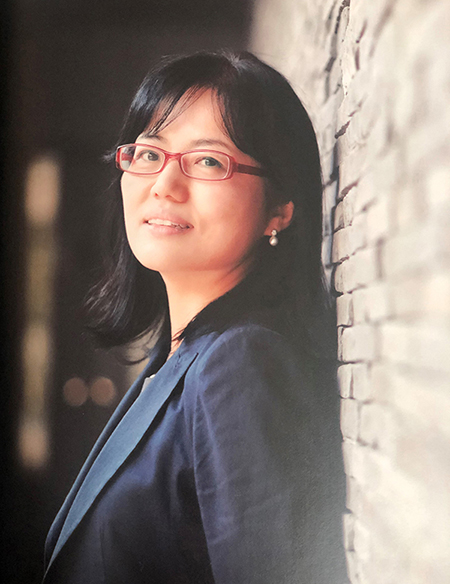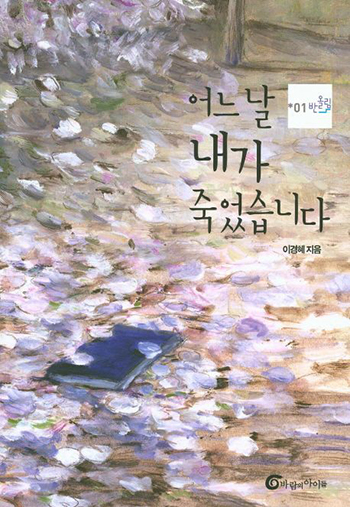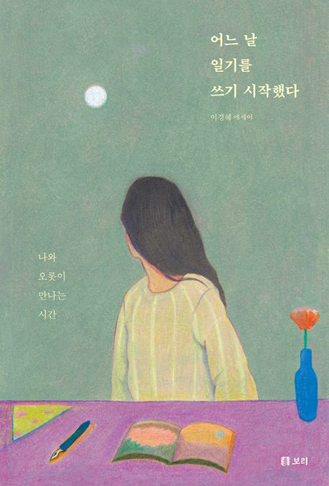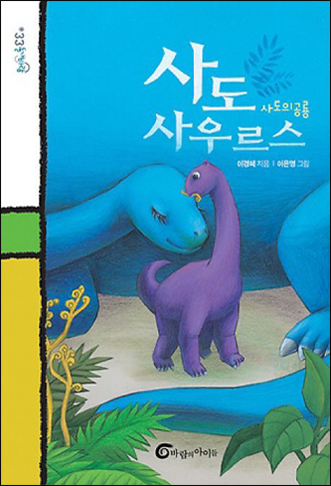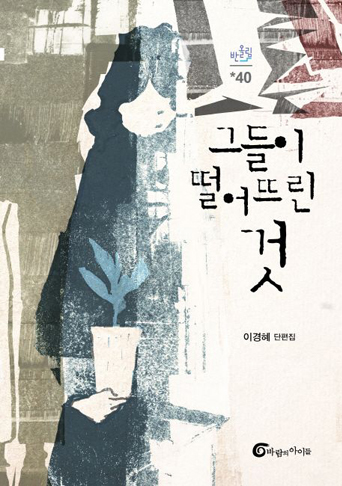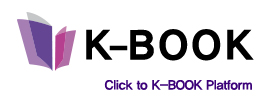|
Korean Authors
Writer Lee Kyung-Hye Writing is About Getting the Thorns Out of Your Chest
2023.07.03
People say that books read during childhood and adolescence have a profound impact on later life. It’s because it’s when the ego develops, and life values are formed. Writer Lee Kyung-Hye, who has been writing and translating various fiction, is also known as the writer of steady-selling children’s and young adult fiction such as One Day I Died (Baram Books). She is a writer who describes not only unlimited, dreamy stories but also frustrating and painful stories like thorns stuck in your heart, through the language of young children and teenagers. Following is an interview with writer Lee, who shows her love for her readers and the world through her stories.

It’s an honor to have you with us for K-Book Trends. Please introduce yourself to our readers.
Hello, everyone. I’m a writer who likes all kinds of water like the ocean, all kinds of animals like cats, all kinds of gods like the guardian spirit of mountains, and all kinds of stationery like the fountain pen. I have been writing stories of various genres - from picture books to fiction - as I like writing itself, including keeping a journal. I have also been translating picture books.

Your major area has been children’s and young adult literature. Was there a reason for choosing it? What’s the unique appeal of children’s and young adult literature that you feel?
I didn’t choose to write about a specific field. But, I always think about what age is best to tell the story I want to deliver. I mainly got to write children’s and young adult literature as readers liked them more than my other works.

It seems that children’s and young adult literature requires a different approach compared to works targeting adults. Is there something you particularly pay attention to when writing children’s and young adult literature?
When I write literary works for children and young adults, I imagine they are sitting in front of me. I actually post a picture of them, too. And, I try to think that I’m telling a story to them. Well, when you’re trying to write for someone your age, you don’t have to have them sitting in front of you like this. But, if you’re writing about the lives of people younger than you, you must keep that in mind at all times. I think this is good manners. It’s not about ignoring them or giving them special treatment. It’s just that you’re being considerate, like speaking slowly to foreigners that are less fluent in our language or refraining from using difficult words in front of children. The message remains the same – it’s the way of delivery that matters.
It’s important to be considerate and polite to children and adolescent readers,

You have been meeting adolescent readers in person by attending the “Make Big Steps in Literature (Munhak, sungkeumsungkeum)” event hosted by Kickkick, a cultural alliance of teenagers. We heard that you’ve had a great response from your readers. So, what was it like to meet adolescent readers in person for such a long time?
Whenever I meet students at this event, I feel grateful that I write fiction for adolescents. In fact, the adolescent period is when a human being goes through great changes. With so much going on in their lives, they must carry big darkness in their hearts. But, they never reveal them – they only show their bright, energetic aspects when we meet at the event. Well, it’s the same with me. It’s how we live. So, I always feel happy and recharge myself through the event.

Korean children’s and young adult literature has been recognized globally. Your book One Day I Died was also translated into five languages and was highly loved by international readers. What do you think is the reason behind the book being so popular in other countries as well?
The most common phrase I heard from students who read the book was, “It was good as you understood our feelings.” The phrase I heard the most from parents was also “Thanks for letting us know about our children’s minds.” I think that was the biggest reason in the Korean market. It feels as if I have made a small connection between them, who could not be understood and could not understand.
One Day I Died

You have been translating English and French children’s literature as well. What are the characteristics and strengths of Korean children’s and young adult literature that you think of as a writer and a translator?
Compared to the literary works published in Western countries, children and teenagers in Korea are under tremendous pressure as they compare themselves to others in terms of academic performance, financial gap, and appearance. So, their resistance to such pressure tends to be more intense than their Western counterparts, where the kids are more stable and respect diverse values. Plus, environmental changes that children and teenagers experience in Korea are influential, too, as Korea is such a dynamic country. Children’s and young adult literature is bound to be dynamic and powerful, as it vividly depicts their struggle to fit in as independent beings. And I think that is the most powerful strength of the genre.
The dynamic and strong power of resistance and struggle is the strength of

You have recently published your first non-fiction book, One Day I Started Writing a Diary (Bori Publishing Co., Ltd.). We heard that you have been keeping a diary for 50 years. You are known to be a diary enthusiast, extreme to the extent that you call yourself a “human that keeps a diary” and a “diary addict.” What attitude do you have everyday when writing it? Also, does that have an influence on your literary works?
There’s no special attitude or mindset about writing a diary. It has become a habit like washing my face. My head clears when I write the journal for the day, just like how washing your face clears your face.
One Day I Started Writing a Diary, Sadosaurus, and Something They Dropped

Can you recommend any of your books that have not yet been published overseas that you think international readers might find interesting?
I recommend reading Sadosaurus (Baram Books), a full-length fiction book for children. It’s about dinosaurs living on an island named “Sado.” The main character, Sua, a purple dinosaur with ears, loves to listen to different sounds. She also likes to sing. The story revolves around her and talks about music, friendship, and solidarity. Even though I’ve written it, I can confidently say it’s a book that will immerse you in the world of dinosaurs.

Last question. What are your next plans or goals?
Well, I’m planning to “not write” things. I might be writing children’s books or general fiction but for young adult fiction – one more and no more. Young adult fiction has been the toughest genre for me, and I think that I have delivered all the messages that I wanted to tell them.
#Lee Kyung-Hye#Children’s Literature#Young Adult Literature#One Day I Died |
Pre Megazine
-

Jakkajungsin Publishing Co.
VOL.69
2024.04 -

Writer Yun Jung-Eun
VOL.69
2024.04 -

Jumping Books Publishing House
VOL.68
2024.03 -

Writer Kim Hwa-Jin
VOL.68
2024.03 -

Publisher Hyohyung
VOL.67
2024.02 -

Writer Minha
VOL.67
2024.02 -

Almond Publishing
VOL.66
2024.01 -

Writer Kwon Jung-Min
VOL.66
2024.01 -

Hakgojae Publishers
VOL.65
2023.12 -

Writer Kim Hye-Jung
VOL.65
2023.12 -

Eidos Publishing House
VOL.64
2023.11 -

Writer Hwang In-Chan
VOL.64
2023.11 -

Munhakdongne
VOL.63
2023.10 -

Writer Chang Kang-myoung
VOL.63
2023.10 -

Happywell Publishing
VOL.62
2023.09 -

Writer Baik Soulinne
VOL.62
2023.09 -

Dasan Contents Group (Dasan Books)
VOL.61
2023.08 -

Writer Lim Kyoung-Sun
VOL.61
2023.08 -

SpringSunshine Publishing Co.
VOL.60
2023.07 -

Writer Lee Kyung-Hye
VOL.60
2023.07 -

Human Cube
VOL.59
2023.06 -

Doctor Jeong Jae-Seung
VOL.59
2023.06 -

Anonbooks
VOL.58
2023.05 -

Writer Son Bo-Mi
VOL.58
2023.05 -

Namhaebomnal
VOL.57
2023.04 -

Writer Kim Bo-Young
VOL.57
2023.04 -

Hugo Publishing
VOL.56
2023.03 -

Writer Cho Kwang-Hee
VOL.56
2023.03 -

Balgeunmirae Publishing Co.
VOL.55
2023.02 -

Writer Lee Byung-Ryul
VOL.55
2023.02 -

Wisdom House, Inc
VOL.54
2023.01 -

Writer Jeong Jia
VOL.54
2023.01 -

Humanitas
VOL.53
2022.12 -

Writer Kim Yeon-Su
VOL.53
2022.12 -

Songsongbooks
VOL.52
2022.11 -

Writer Eun Hee-Kyung
VOL.52
2022.11 -

Bombom Publishing Co.
VOL.51
2022.10 -

Writer Jiwon Yu
VOL.51
2022.10 -

Hangilsa Publishing Co., Ltd.
VOL.50
2022.09 -

Writer Kim Won-Young
VOL.50
2022.09 -

Moksu Publishing Company
VOL.49
2022.08 -

Writer Yoo Sun-Kyong
VOL.49
2022.08 -

Next Wave
VOL.48
2022.07 -

Writer Park Sang-Young
VOL.48
2022.07 -

A Thousand Hopes
VOL.47
2022.06 -

Writer Bora Chung
VOL.47
2022.06 -

Woongjin ThinkBig
VOL.46
2022.05 -

Dr. Oh Eun-Young
VOL.46
2022.05 -

JECHEOLSO Publishing House
VOL.45
2022.04 -

Writer Jang Ryu-Jin
VOL.45
2022.04 -

Changbi Publishers
VOL.44
2022.03 -

Writer Kim Ho-Yeon
VOL.44
2022.03 -

Mati Books
VOL.43
2022.02 -

Writer Lee Kkoch-Nim
VOL.43
2022.02 -

Picturebook Gongjackso
VOL.42
2022.01 -

Writer Kim Sang-Wook
VOL.42
2022.01 -

Writer So-yeon Park
VOL.42
2022.01 -

Writer Yoo Eun sil
VOL.42
2022.01 -

Kungree Press
VOL.41
2021.12 -

Writer Kim Lily
VOL.41
2021.12 -

Writer Park Yeon-jun
VOL.41
2021.12 -

Writer Yi Hyeon
VOL.41
2021.12 -

A deeper world told through picture books 'Iyagikot Publishing (Story Flower)'
VOL.12
2019.06 -

Author Jeon Min-hee
VOL.12
2019.06 -

Illustrator Kim Hwan-Young
VOL.13
2019.07 -

Travelers sailing through the sea of knowledge - 'Across Publishing Group Inc.'
VOL.13
2019.07 -

Genre Novel Publisher 'Arzak Livres'
VOL.14
2019.08 -

Author Lee Yong-han
VOL.14
2019.08 -

Wookwan Sunim
VOL.15
2019.09 -

East-Asia Publishing
VOL.15
2019.09 -

Author Jo Jung-rae
VOL.16
2019.10 -

EunHaeng NaMu Publishing
VOL.16
2019.10 -

Writer Heo Kyo bum
VOL.40
2021.11 -

Writer Kim So-Young
VOL.40
2021.11 -

Author-illustrator Kim Sang Keun
VOL.40
2021.11 -

ACHIMDAL BOOKS
VOL.40
2021.11 -

Author Kang Gyeong-su
VOL.17
2019.11 -

Moonji Publishing Belongs to the Literary Community
VOL.17
2019.11 -

Author Kim Yun-jeong
VOL.18
2019.12 -

I-Seum
VOL.18
2019.12 -

Kim Cho-Yeop
VOL.19
2020.02 -

Creating a window into the future with books
VOL.19
2020.02 -

Author Serang Chung
VOL.20
2020.03 -

Hey Uhm
VOL.20
2020.03 -

Writer Lim Hong-Tek
VOL.21
2020.04 -

BIR
VOL.21
2020.04 -

Writer Song Mikyoung
VOL.39
2021.10 -

Author-illustrator Kim Dong Su
VOL.39
2021.10 -

Writer Lee Seula
VOL.39
2021.10 -

Tabi Books
VOL.39
2021.10 -

Writer Kim Soo-hyun
VOL.38
2021.09 -

Author-illustrator Lee Myoung Ae
VOL.38
2021.09 -

Writer Hwang Sunmi
VOL.38
2021.09 -

Kidari Publishing Co.
VOL.38
2021.09 -

Writer Sohn Won-Pyung
VOL.22
2020.05 -

Woods of Mind's Books
VOL.22
2020.05 -

Writer Heungeul
VOL.23
2020.06 -

Gloyeon
VOL.23
2020.06 -

Maumsanchaek
VOL.24
2020.07 -

Winners of the 2021 Bologna Ragazzi Award
VOL.37
2021.08 -

Picture book artist Lee Suzy
VOL.37
2021.08 -

Author-illustrator Yi Gee Eun
VOL.37
2021.08 -

Hubble
VOL.37
2021.08 -

Writer Baek Se-Hee
VOL.25
2020.08 -

Bearbooks Inc.
VOL.25
2020.08 -

Author Baek Hee-Na
VOL.26
2020.09 -

Yuksabipyoungsa
VOL.26
2020.09 -

Writer Kang Hwa-Gil
VOL.27
2020.10 -

Kinderland (Bandal)
VOL.27
2020.10 -

Writer Ha wann
VOL.36
2021.07 -

Author-illustrator Myung Soojung
VOL.36
2021.07 -

Writer Jung Yeo-Wool
VOL.36
2021.07 -

Publisher EcoLivres
VOL.36
2021.07 -

Writer Lee Geumi
VOL.28
2020.11 -

Sakyejul
VOL.28
2020.11 -

Writer Kim Keum-Hee
VOL.29
2020.12 -

Geulhangari
VOL.29
2020.12 -

Writer Cheon Seon-Ran
VOL.30
2021.01 -

Hyang Publishing House
VOL.30
2021.01 -

Writer Lee Hee-Young
VOL.31
2021.02 -

Sanzini
VOL.31
2021.02 -

Publisher Prunsoop
VOL.32
2021.03 -

Writer Sim Yun-Kyung
VOL.32
2021.03 -

Hanbit Media
VOL.35
2021.06 -

Hyeonamsa
VOL.33
2021.04 -

Author-illustrator Noh Inkyung
VOL.33
2021.04 -

Writer Cho Won-Jae
VOL.35
2021.06 -

Writer Kim Jung-Mi
VOL.34
2021.05 -

Safehouse Inc.
VOL.34
2021.05


